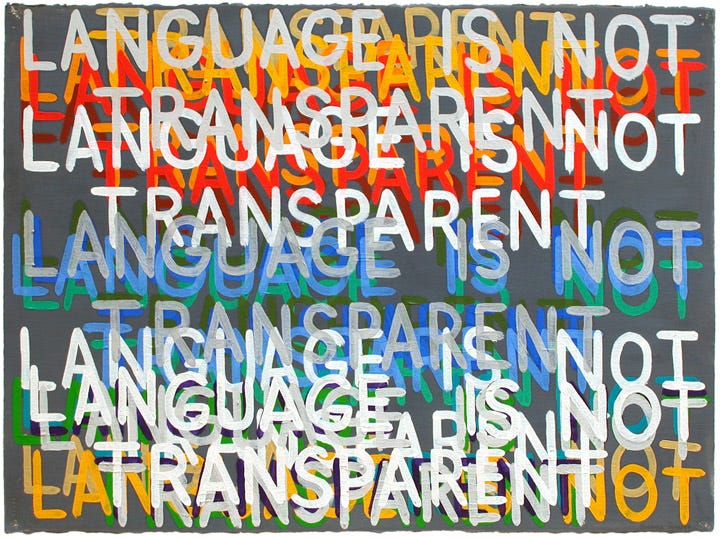words
language is powerful, language is limited
What were the most hurtful words someone ever said to you? If you’ve lived at all, you can probably come up with an answer, and if you’re a sensitive person, maybe a half dozen. But if I were to ask, what was the nicest thing someone ever said to you, would you remember?
Part of this is because we have a negativity bias. We tend to remember slights and wrongdoing more than acts of kindness. We fixate on what could go wrong rather than on positive outcomes. It’s a survival mechanism.
Words are powerful and limited, costly and cheap. You could turn to your partner and ask, do you still find me attractive? And he might say “yes” or “no.” But what does that mean? Maybe what you mean by “attractive” isn’t what he means, and maybe one day he feels attracted to you, and the next day, less so. If he says yes, would you believe him and feel better, or would you wonder if he’s just saying it to appease you? If he says no, would you leave him or would you look for ways to interpret his “no” as a “yes”?
We look for validation and reassurance in words, and yet, we’re also skeptical of language. Words don’t mean as much as we want them to, but we should still treat them with care because while they can be shockingly limited 90% of the time, they are powerfully destructive the other 10%. And it’s impossible to know which it’ll be.
In The Four Agreements, Don Miguel Ruiz tells the story of a girl who was singing so loudly it annoyed her mother who had just come home from a bad day at work and wanted nothing more than peace and quiet. The mother yelled at the girl to shut up and told her she had an ugly voice.
She [the girl] became shy at school, and if she was asked to sing, she refused. Even speaking to others became difficult for her. Everything changed in the little girl because of this new agreement: She believed she must repress her emotions in order to be accepted and loved.
— Don Miguel Ruiz, The Four Agreements
We all conduct our lives under the spell of certain words. Sometimes, we’re not even aware of which ones have a hold on us. I fully abide by the first agreement: Be impeccable with your words. Wrong words can wreak irreparable damage. When you look at healthy relationships that go awry, you can usually trace the turning point to a series of unfortunate words.
This line from Alain de Botton’s The Course of Love sank its teeth into my heart when I first read it and hasn’t let go:
He can’t help himself. He’s impelled to say the worst things, to try to smash the relationship to see if it’s real and worth trusting.
— Alain de Botton, The Course of Love
This instinct is so painfully relatable. Sometimes, we use words to hurt the person we love because subconsciously we need proof that they won’t commit the ultimate crime of abandonment. Unfortunately, the other person has no way of knowing this, and they take our words at face value.
I know the story of a woman who was afraid her boyfriend would leave her for someone he found attractive and had known for many more years. Paranoid and already hurting under the trance of this possibility, she said to him, “Maybe we’re not compatible. Maybe there’s someone out there who’s better for me and someone who’s better for you.” The person saying those words wanted reassurance that the opposite was true, but the person receiving them heard I don’t think we’re right for each other and began to seriously doubt the relationship.
Words are dangerous. It’s incredible that we’re entrusted with such destructive weapons every day. But silence can be deadlier: the woman’s outburst came after weeks of keeping her insecurities to herself. And if the mother had told the child she needed some quiet time before her patience wore out, the words “ugly voice” probably never would’ve crossed her lips, and the child would still be singing today.
Some people use silence to play mind games (e.g. pretending not to be bothered by someone’s behavior, waiting hours to respond to a text). This type of restraint might work, but it’s psychologically torturous. It’s much healthier to be upfront about what’s bothering you without overwhelming the other person with a litany of grievances. Even the most avoidant people respond well to honest and direct communication.
We need to choose our words wisely, but we also need to speak up sooner. I think that’s part of the reason I enjoy writing this Substack: the slow intentionality of putting one word down, then another, taking it away, trying to get just a little closer to what I really want to say—then hitting “publish” before my insecurities can silence it all.


